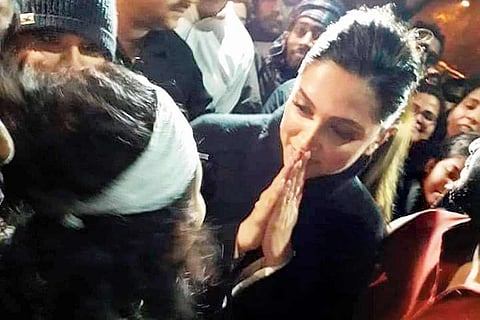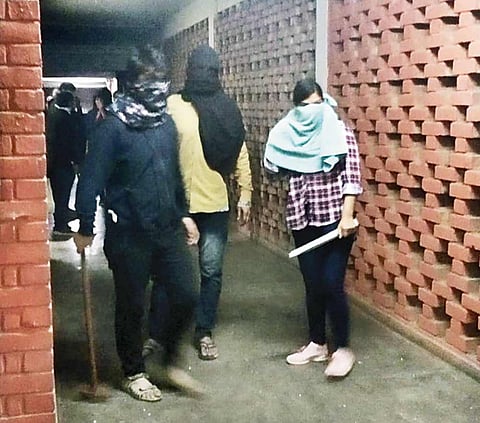Even for a place so fabled for being a political laboratory, the first Sunday of 2020 would be remembered as a plot-turning chapter for Jawaharlal Nehru University. On January 5, a campus where student politics is mostly high-minded polemic, and slogans are the harshest weapons in view, was served with a more ominous version. A Bloody Sunday it was, as over 50 “unidentified goons” entered the campus and injured over three dozen people, including students and teachers, and vandalised varsity property. The proximate cause—a long-running agitation against a massive fee hike—may seem unconnected to other things, but in the backdrop of countrywide protests, including in other campuses, the episode bled into the larger anti-CAA story frame. The same protagonists and antagonists ranged against each other, just a new inflection point.
January 5, A Blood Sunday At JNU: More Questions Than Answers. Did Police Right The Wrongs?
Jawaharlal Nehru University will continue to remain in the news as students demand the Vice Chancellor's resignation and protest against fee hike. But there is more than meets the eye
Eyewitnesses say it started between 5 and 5.30 pm, as the teachers association (JNUTA) was winding up its peace march around Sabarmati Hostel—this is placed north-central in the sprawling, 1,019-acre campus, supposed to be manned by a private security agency called Cyclops. That’s when, suddenly, everybody started hearing shouts and screams. A group of masked people went from hostel to hostel—reminiscent of Klanners in the grainy phonecam videos that emerged later (see pic)—attacking students with stones, rods and sticks. The mob chased everyone who came en route. The rampage lasted over 3-4 hours. The precise details relating to the police are disputed. Some say they were called in only after substantial damage was done; others speak of knowing inaction and complicity, especially as videos purportedly showed them allowing the attackers to leave unharmed. The mob seemed to know its work—the injured were mostly those from the Left, including JNUSU president Aishe Ghosh, who had to be treated for a bleeding head wound and hand injuries at AIIMS.
The incident did not take long to blow up across national and social media, setting off a wave of anger and condemnation. Students and teachers were not the only ones who expressed solidarity with the JNU fraternity by holding protests in their campuses and cities across the country. Even Bollywood began to shed its tactical reticence as directors like Vishal Bharadwaj, Anurag Kashyap and Sudhir Mishra joined the crowds. Stars like Sonam Kapoor and Alia Bhat too joined their more vocal colleagues on social media. And interest spiked as superstar Deepika Padukone visited JNU (see pic) and lent her presence at a session of sloganeering by former JNUSU president Kanhaiya Kumar.

As international media too picked up the story, Union home minister Amit Shah finally ordered an inquiry. Till the filing of this report, four FIRs had been registered over 2-3 days: ironically, two were against JNU students who had been injured in the attack (on an older complaint by the university administration). The attack itself is presently attributed to “unknown persons”, though some known ABVP members were linked by media to photo/video evidence and a much-circulated Whatsapp chat purportedly begun to help plan and coordinate the attack. The ABVP put out stout denials; and Pinky Chaudhury, leader of a ‘fringe’ far-right group called Hindu Raksha Dal, soon popped up on a video, claiming responsibility and promising more violence, much in the fashion of terror groups. No arrests have been made.
The ABVP has its story of earlier violence by Left union members, apparently blocking an administration-led academic registration drive. But says Apeksha Priyadarshini, a student councillor and member of the Bhagat Singh Ambedkar Students Organisation (BASO): “The scuffles started on January 4 morning when protesting students were attacked by Cyclops security officers and ABVP members. But, on January 5 evening, the unprovoked violence took an ugly turn. We saw right-leaning faculty members encouraging goons and ABVP students to teach a lesson to Left students. The attackers were even trying to find Muslim students and beating them.”
A faculty member told Outlook that an Urdu professor was beaten up “till they realised he was a Hindu”. A PhD scholar Apeksha was beaten up by a mob on January 4 and fractured her left arm. But an FIR has been lodged against her.
Regardless of the facts about any earlier skirmishes, the ‘response’ was indeed designed to be mind-numbingly disproportionate and nightmarish. “They first threw stones at us during our peaceful meeting at Sabarmati T-point, the size of half a brick,” says Prof Atul Sood, former JNUTA president. “After people started running in panic, the mob came… aiming to destroy everything in their way: students, teachers, vehicles.” Assistant Professor Bikramaditya Chaudhary of the Centre for the Study of Regional Development says his wife was on her evening walk when she was chased down. “My wife came running breathless. We called the police, the administration, the women police helpline…to no avail. The mob stood outside our door and banged continuously. They went door to door in the teachers’ housing complex.”

Tension had been brewing for around four days, after JNUSU decided on December 31 to boycott the next semester registration process to protest the fee hike. The decision had divided the students cleanly along political lines: a section wanted to go ahead with registration, others opposed it and sought a united boycott. The administration, locked in battle with the protesting students, had not intervened. Vice chancellor M. Jagadesh Kumar, who has had a controversial tenure since his 2016 appointment, is seen as clearly leaning to the right by the other side. Those injured alleged that the VC’s administration and the Cyclops security agency they appointed stood as mute spectators during the violence.
The incident has indeed left several unanswered questions. How can a mob enter a gated campus like JNU without any hindrance? Why are the police not following up on the lead provided by the infamous WhatsApp group? Why did it not intervene while the mayhem was on? It was alerted, and was clearly present in the latter hours. Whose heads will roll for the attack?
As of now, there’s a mismatch between what the victims recount and the ‘official’ response, as also a gap between the self-absolving administration/police versions. “I called up the SHO around 3.30 pm and alerted him that some unknown people with rods were roaming inside the campus,” says Aishe Ghosh. “He assured me protection, but the police came only after 8-9 pm. The security guards left the campus as soon as the clashes started.”
Justifying the late arrival of the police, the vice chancellor says the first attempt is always to control situations with private security. “If it goes beyond their capacity, then we approach the police. We don’t want any innocent people to be injured. On Sunday also we did this,” he says. Delhi Police spokesperson Mandeep Singh Randhawa says the onus of security inside JNU lies with the administration—“we have responded to PCR calls and the law-and-order situation professionally.”
The role of Cyclops is naturally under the scanner. “How can security guards in a gated university allow strangers to enter the campus?” asks Ramesh Kumar, a student and eyewitness. But Col K.P.S. Rana, Cyclops executive director, duly denies any lapses. “Each hostel has one security guard. Can one guard fight a mob armed with stones and rods? As per the Private Security Act, a guard is not even allowed to keep a stick or bash up anybody. He is a kind of watchman whose job is to inform the administration, which we did. Among those injured are also four guards, including a woman.”
JNUTA and student leaders like Aishe, who say their protest against the fee hike will continue, demand the VC’s resignation, but sources in the Union HRD ministry say it’s unlikely. The prospect of JNU dropping off the news space soon? Equally unlikely.
Tags